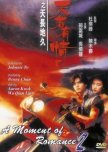
Disappointingly unfocused
Right out of the starting gate, it's hard not to be disappointed and perhaps even slightly insulted by A Moment of Romance II. It's horribly unfocused, sharing very little of the original film's excitement or romance along with contrived plotting that doesn't add up to more than manufactured pathos. While the first film at least had some thematic and dramatic justification for its tragic resolution, this one seems to follow a similar pattern to get a rise out of this audience. It doesn't work; you have to care about the characters first. Johnnie To certainly didn't ghost-direct this one... That being said, this is far from a poorly made film, Benny Chan does a more than decent job in the film's direction. The actors all do a decent job with the material given even if Aaron Kwok isn't a real replacement for Andy Lau, the real highlight is the typically slimy Anthony Wong, and the music by William Wu does evoke some form of emotional resonance. Sadly, A Moment in Romance II spreads itself too thin; one that doesn't work as a romance or a thriller, a tragic case of a film trying to be everything to everybody, and ending up as a bit of nothing to no one.Was this review helpful to you?
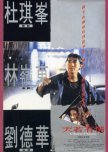
Far more than a teenybopper romantic fantasy
One of the most imitated and popular Hong Kong productions of the 90s, A Moment of Romance sees a modern-day Romeo and Juliet-style tale under the veil of contemporary underground Triad warfare, far more than a teenybopper romantic fantasy. In many ways the film is responsible for many a cliché within its industry; a disaffected youth, the good girl romantic interest and a cartoonish villain, however, it's the way these clichés are all assembled within the film that makes it so memorable. "Director" Benny Chan has his way with the clichés and throws in enough slow motion, syrupy Cantopop music video montages and hyperemotional crescendos to tax even the weepiest audience member. The core emotions that the film mines are so innately compelling that they're not lost beneath bombastic montages or sudden flashes of gangland violence. It's often stated this was heavily ghost-directed by Johnnie To and it's not hard to see why, so much of the film carries many of his later stylings. The film works because it is a consciously chosen cinematic style and is used without fear with all available means with the superb cast all delivering perfect performances to compliment. Andy Lau brings righteous anger and hidden tenderness to an exceptional genre character. What's so compelling about the character and the performance is that Wah Dee acts and very rarely talks. His decisions have believable and compelling consequences with the affirmation of Dee's morality coming with a price, and only one outcome is truly possible. Put simply, A Moment of Romance has it all; fiery action, sweeping cinematography, an unforgettable love story and beautiful chemistry, quick-witted humour, a beautiful score and more. The film triumphs, not despite its genre excess, but perhaps because of it.Was this review helpful to you?
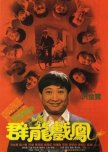
As entertaining as they come
You know your film is off to a strong start when you aren't even 5 minutes in and it's already staging its own lightsaber fights, albeit with fluorescent bulbs. Marking the end of Sammo Hung's greatest period as both star and director with a mighty bang, Pedicab Driver exemplifies the type of cinema that Hong Kong loved during the 80s. What that means is it's a mismatched series of bizarre comedy, heightened emotions, sudden tragedy and yes, incredible fight scenes. The extended fight between Sammo and Lau Kar-Leung in the gambling den stands as one of the film's most memorable moments, despite its complete irrelevance to the plot. Although it seems a little overambitious at times in its storytelling, with several seemingly unrelated threads running parallel, the film does manage to hold it all together in a way that only Hong Kong cinema can. While the story threads are certainly only diversions from the main spectacle, they do enhance the film somewhat, thanks largely to the cast's terrific performances and great music. It all starts happy-go-lucky but by the end, revenge is the name of the game and it is one Sammo delivers tenfold with some fantastic direction. For its uneven mishmash of genres and tones, Pedicab Driver succeeds wholeheartedly thanks to its easily empathetic and loveable characters and their plights, it's as entertaining as they come and features something for everyone. While not quite a masterpiece it is well worth seeing.Was this review helpful to you?

A celebration of love
Falling in love is easy; falling out of love is harder. This is where Comrades, Almost a Love Story succeeds; its tragic beauty is undeniable. It's a heartfelt story of two mainlanders caught in fate's grand design, an incredibly moving film full of soulful looks, lingering glances and averted eyes. Director Patrick Chan and writer Ivy Ho throw every romantic convention imaginable into the film, Chan's direction remains restrained and respectful, holding back from too much sentimentality; while Ho's script is rich with wonderful details, drawing upon the culture and the history of recent Hong Kong. Although she eventually falls upon clichés to bring the film full circle, the plot devices don't feel like plot devices but combined with a beautiful piano-laden score means its no deal breaker. Maggie Cheung is wonderful here; her luminous screen presence just lights up the film, while Leon Lai turns in an admirable performance of his own, although occasionally wooden at times, it's lovely to see him inhabit such a real character. Destiny is a force that fascinates Hong Kong, which is understandable as they've felt themselves swept along by the river of history, with little or no control over their eventual fate. Yes, there's a certain drag to it and sometimes it's even a little melodramatic but ultimately Comrades, Almost a Love Story is a wonderfully beautiful celebration of love and all the challenges it brings.Was this review helpful to you?
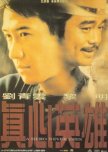
Heroes never die, they live forever
Just as much a tribute to the heroic bloodshed films of yesteryear as it is a brilliantly stylised entry in its own right, A Hero Never Dies is a pure exercise in genre film despite being so hard-boiled that it almost becomes a comedy. Taking a fundamentally tried, tested and clichéd story in a world where the violence is more sudden and the atmosphere much darker and upending nearly every element of the films he's paying homage to, shows the power of Johnnie To's filmmaking ability. To's direction is fantastic with plenty of sweeping camera movements and tremendous use of colour, all coupled with Cheng Siu-keung's outstanding photography make the film a feast for the eyes. The incredible sense of loyalty and honour these characters display ultimately makes them “heroes", the themes are often hammered home so relentlessly that the film nearly enters the realm of parody. Only in a gangland fantasy would characters enjoy a friendship but have no qualms about killing one another later. The performances from its central cast are phenomenal, Leon Lai and Sean Lau especially, both playing fundamentally different archetypes of the same profession to immense effect, all the while Raymond Wong's hauntingly powerful score dominates the sound mix, even if he does repeat a few too many cues from his work on Running Out of Time. A Hero Never Dies ultimately just solidifies to me that Johnnie To is one of, if not the best post-handover filmmaker in the industry. Heroes may die, but their actions live forever.Was this review helpful to you?
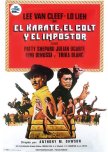
Brilliant fun
A bizarre concoction of comedy, martial arts, and spaghetti western action, The Stranger and The Gunfighter is hard to fault in terms of sheer entertainment value, one that works because, unlike other Shaw Brothers collaborations, ergo Legend of the 7 Golden Vampires, it doesn't take itself too seriously. Most of the comedy is daft, but there are a few inspired jokes littered throughout, even with the rather repetitive script the film never wastes too much time in one spot, leading the two heroes from one fantastic set piece to another with an admirable pace. The film makes the best of the opposition between the polite, dutiful Easterner and the selfish, roguish Westerner, but without making any serious socio-cultural statements. It helps enormously that both Lo Lieh and Lee Van Cleef are the leads, Cleef is especially funny in the film which makes a nice change from his roles as the villains and stoic characters in his earlier spaghetti westerns while Lieh is just as awesome as he always is. Antonio Margheriti's direction is pretty great but the unfortunate grotty transfers this film has been confined to do his work a major injustice at points as his photography of the Almeria locations gives the film a paramount look which works exceptionally well with Carlo Savina's fun score. A well-balanced mix of exploitation comedy, The Stranger and The Gunfighter is well worth a look for aficionados of either genre.Was this review helpful to you?

A cautionary parable for man's true acquiescence to the natural world
Toshiharu Ikeda's elemental and mythical adaptation of Takashi Ishii's Angel Guts manga, Mermaid Legend, evokes a lyrical sadness for the fading way of life of seafaring fishermen and ama divers. One that starts as a relatively tender study of grief but shifts dramatically in the latter half to become an absolutely brutal exploitation blood-drenched angel of vengeance and yet, despite those exploitation tendencies, it also channels the intense anti-nuclear sentiment of the decade. An eco-thriller that finds the incursive grasp of industrialisation and corporate greed encroaching on natural realms. Ikeda directs a film that begins a presentation lingering somewhere between the realistic and the idyllic, almost artful in several scenes but it's not long before the film shows its true colours, which are essentially bathed in the red of blood. Mari Shirato gives an astonishing performance as Migiwa, managing to capture everything from sorrowful and vulnerable as much as vengeful and unstoppable, a real shame she wasn't in more. Combined with a truly haunting piano score by Toshiyuki Honda, Mermaid Legend remains a brooding requiem for loss, a cautionary parable for man's true acquiescence to the natural world.Was this review helpful to you?
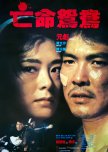
This review may contain spoilers
Simply magnificent
I genuinely can't believe I put this film off for so long! A darker-than-dark neo-noir thriller, On the Run, is exactly the kind of film I adore one that's raised to another level by an incredibly dark sense of humour and a knack for doing the unexpected. It takes you for a ride, managing to assault, frustrate and delight regularly never ceasing to be entertaining or compelling. It's far from uplifting, a constant overhanging anxiety plagues its characters from the then-upcoming Chinese takeover of Hong Kong, even in 1988 they were worried about the future, it gives the film a suitably grim atmosphere even in the face of its stunning visuals. It's so weird to think that Alfred Cheung was more well-known for his comedies because watching this you honestly wouldn't know it. He perfectly complements the gloomy theme with dark cinematography of the black, Hong Kong horizon dimly lit with the traditional glow of neon lights. It is almost impossible to not be utterly captivated by its mood. As much as this is one of Yuen Biao's finest performances, the film is absolutely stolen by Pat Ha; displaying an intense physical presence throughout as a cold-blooded hitwoman with a heart of gold that commands incredible respect and sympathy. Aside from an incredible pole-slide stunt performed midway through by Yuen Biao, all the action is played with a brutal realism that's nothing short of spectacular, especially that final fight. Featuring a brilliantly crafted script that moves at lightning speed and a truly unforgettable musical score by Violet Lam, I cannot find myself praising On the Run enough, it's simply terrific.Was this review helpful to you?

A beautiful paradox
At the heart of the incredibly titled Beach of the War Gods is a beautiful paradox, one built upon love and shame, it's wuxia mayhem by way of Kurosawa and Leone all filtered through the eyes of Jimmy Wang Yu. Whilst hand-to-hand combat had started to become the name of the game following the dawn of the 1970s, this film sees Wang Yu take a decisive step back from what he was more well-known for, to make a film in the genre that had previously dominated, the wuxia. Granted, it does look a little rougher around the edges than many of its contemporaries, but its ambition and scope are to be marvelled at. Wang Yu makes fabulous use of the wide frame with some brilliantly composed and thoroughly beautiful shots sprinkled throughout. It's enriched with depth, movement and a constant visual interest to keep you engrossed with wind machines regularly blasting away, waves crashing dramatically and fire adding powerful amounts of colour. And this is all before I mention the film's awe-inspiring and action-packed finale that brings 25 minutes of uninterrupted magnificence to the forefront. Yes, the characters and plot are exceptionally flimsy and the dialogue is superficial at best; yet the stripped-back approach works in Beach of the War Gods' favour, never intruding upon its gloriously bloody action and rushing towards its lengthy, epic final battle without any fat getting in the way.Was this review helpful to you?
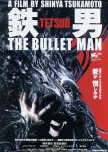
A film out of time
A film out of time, there's something rather tragic about Tetsuo: The Bullet Man, it's just so poorly misguided that it ends up feeling off in direct contrast to its predecessors. There's a good film in here somewhere but it feels like a film from a different era, one that for all Tsukamoto's intent does not work as intended. It's hard not to assume he knew what he was doing. When he made The Bullet Man's face first turn to iron, he must have known that face paint looks cheap. He must have known those hyper-awkward script deliveries from a cast and crew who don't share the same language as its American lead would come across as embarrassing. It certainly feels like Tsukamoto knew full well that certain elements would be off and just tried to run with it, the zaniness is here but it feels wrong. The digital look does not work for this film with the overly excessive shakey cam coming across as simply nauseating, there's rarely a moment it sits still. The film's obnoxious sound mix only alienates the audience further, with dialogue delivered in hushed whispers but seemingly everything else amped up to eleven, I found myself adjusting the volume way too often to even attempt to engage with the film. Ultimately, Tetsuo: The Bullet Man feels more like a poor man's American remake of the original duology, lacking the gonzo mystery and waking nightmare horror. Trent Reznor's theme song is a banger though.Was this review helpful to you?
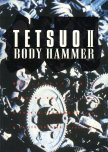
More of the same
Tetsuo II: Body Hammer is Tsukamoto's Evil Dead II, a sequel that reworks the original with more technical polish on a larger budget. There's a big thematic shift from the erotic to the militaristic, with a greater focus on biogenetic weaponry, one that's far less frantic, instead focusing on developing its characters and providing them with a narrative to inhabit. The production values are much higher than that of its predecessor with Tsukamoto's head-spinning experimentation still on full display, the move away from monochrome allowing him to add strong colour filtration to a heady visual brew of crazy editing and bizarre cinematography. Shinya Tsukamoto is a man who knows what he's doing at this point. Ultimately while Tetsuo II: Body Hammer may lack the more disturbing elements of the original, the eccentricities are still here; filled with some excellent sequences and something to say about industrialisation while incorporating some top-notch effects work, leaving it as a very solid piece of filmmaking and a prime example of confrontational underground Japanese Cyperpunk cinema.Was this review helpful to you?
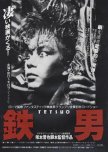
Metallic Mayhem
Metallic mayhem and graphic depravity fly thick and fast in Tetsuo: The Iron Man, it draws on the marriage of flesh and technology that inspires so much of David Cronenberg's work and twists it into a manga-influenced cyberpunk vision. This 67-minute lunacy is probably the closest approximation to capturing a sustained migraine in pure celluloid form, what's on screen borders on the extreme and experimental, all matched by a hysterical and unnerving score. Chu Ishikawa's clattering metal percussion and unrelenting terror synths sometimes border on unlistenable but add to the film's uniqueness and disgusting style. Less a coherent plot than a series of disturbing images loosely struck together, confrontation and violence erupt at breakneck speed in this nearly dialogue-free odyssey, assaulting every sense it can with the tenacity and ingenuity of DIY filmmaking. The stop-motion effects give the fusion of bared wires and exposed ganglia an unnervingly vivid physicality. A hysterical, histrionic ode to cyberpunk fetishism, Tetsuo: The Iron Man was one of my early ventures into the realm of Japanese cinema, one that really isn't my thing but is unquestionably a feat of imagination and technique yet an hour of it is more than enough.Was this review helpful to you?
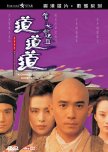
Sumptuous
Simultaneously a distant sequel and retread of the original film, A Chinese Ghost Story III keeps things together a bit more than II did, following the tradition of the previous two films this closing chapter once again gifts us with equal doses of comedy, action, romance and horror. The photography is as gorgeous as the previous entries, playing with colour, light and smoke with an abundance of stunning direction throughout, Tony Ching Siu-Tung certainly pulled his weight with this series balancing his style with Tsui Hark's eccentric sensibilities. Instead of Leslie Cheung's bumbling tax collector, we get Tony Leung as a bumbling novice monk, a worthy successor, adding a great charm and likeability to his character thanks to Tony's comedic timing. The film delivers a cinematic seductiveness that greatly benefits from the fast-paced plot, chock full of crazy magic spells and action sequences, spellbinding female ghosts, hair-raising demons, a touch of humour, drama and romance, a parade of crazy special effects and a sumptuously enchanting score for a third time courtesy of James Wong and Romeo Diaz. While it may certainly have many similarities to the first, A Chinese Ghost Story III almost plays like a parody of it at the same time, all without being too ridiculous and closing the trilogy out in style. The lengths men will go to for Joey Wong hey?Was this review helpful to you?
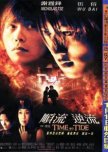
Genesis
Time and Tide is Tsui Hark's Genesis, his attempt to start again, a rebirth. Made after his failure to break into the American market with his Van Damme duology, Time and Tide is a question of trust, renewal and the ebb and flow of time that lead both its characters and the narrative, a very confusing narrative but a narrative nonetheless. The film's appeal lies in its contemporaneousness, of its time yet still ringing true today, not seeming outdated in the slightest with Hark's style is all over the movie and yet not at all. There are his usual tried and tested techniques but at the same time something totally different; that alone makes his movies oh-so utterly fascinating, evocative of older wuxia flicks. While it might seem generic on the surface, Time and Tide is a fabulous take on an action noir thriller with a new wave twist.Was this review helpful to you?
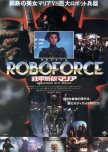
Frank Miller on drugs
I Love Maria is like if Frank Miller got stoned halfway through writing RoboCop 2, suffered an intense acid trip while watching Metropolis with Gundam playing in his mind and then got Tsui Hark to direct and star in it. Horrendously cheesy but entertaining from start to finish and of course, Tony Leung and a robotic Sally Yeh to top it all off.Was this review helpful to you?





